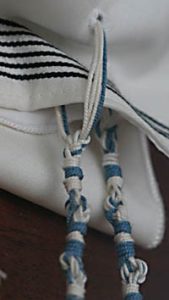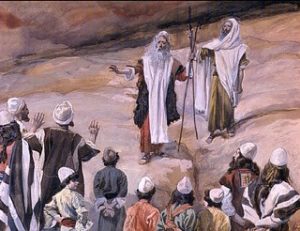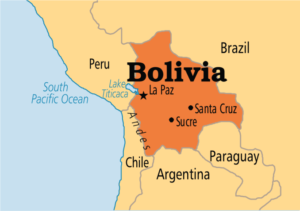CITIZENS OF A PLACE NOT YET SEEN; KORAH’S REBELLION AND CHRIST’S CRUCIFIXION
In the Book of Numbers Chapter 14, after the tenth incident in which the people of Israel’s unbelief provoked the Lord’s anger, the Lord gave an oath that none of those who were over twenty years old would live to enter into the Promised Land.
WE LIVE IN THE PRESENT MOMENT, SUBJECT TO THE GOVERNMENT OF THE FUTURE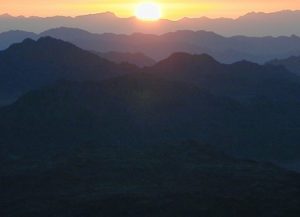
In the Book of Numbers, Chapter 15, the LORD gives these same people further instructions pertaining to how worship is to be conducted, justice satisfied, and forgiveness obtained, when their children inherit the land from which they themselves will be excluded. Once again, we see how the purposes of God are not thwarted by their unbelief.
He reminds them that although the remainder of their days will be lived out in the wilderness, they belong to the land they have not possessed, and they are to be mindful of its laws.
This is a reminder that all of us are accountable to the rule of God, and those of us who have been given the gift of future access are to set our minds there. We are to live with the laws of the future age affecting our present, even praying today, “Thy kingdom come, Thy will be done.”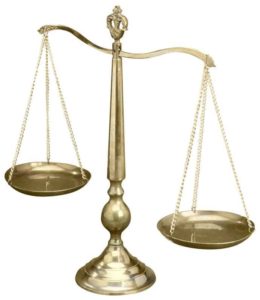
In Numbers 15:22 Moses repeats instructions pertaining to the sacrifices for unintentional sins that are committed once they come into the land. But he also reminds them that there is no provision in the Law of a sacrificial offering for a person who deliberately defies God’s law; to do so is blasphemy which is punished by being cut off from among the people.
31 “Because he has despised the word of the LORD and has broken His commandment, that person shall be completely cut off; his guilt will be on him.” (Numbers 15:31; NASB)
This reminds us that sin separates. The wages of sin is death (Romans 6:23a). Our hope is not in any sacrifice we can bring. Our only hope is in the mercy of God which is shown to us in God’s sovereign loving choice to bring a ‘once and for ALL sacrifice’ through His Son’s voluntary offering to provide atonement for our sin on the cross. This makes possible a free gift of eternal life (Romans 6:23). The gift is not given on the merits of any sacrifice we could bring.
GOD’S AUTHORITY IS UPHELD IN THE LAW – SIN MUST BE PUNISHED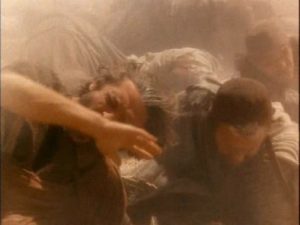
God’s Word is not to be taken lightly. His authority is to be respected. The incident in Numbers 15:32-36 demonstrates that God’s laws are enforceable and will be enforced. The man who violated the Sabbath law was punished by being stoned to death, “just as the Lord commanded Moses” (verse 36).
After the people of Israel receive the verdict that none of them older than twenty will enter the land, the exception being Joshua and Caleb, the Lord instructs them all to attach tassels on the corners of their garments. Each tassel reminds them of the commandments of the Lord for which they are accountable. They are to put cords of blue on the tassel of each corner. The color blue represents heaven and prophetically points to ‘the man from heaven’, Jesus Christ, who would fulfill the commandments on their behalf.
47 The first man is from the earth, earthy; the second man is from heaven. 48 As is the earthy, so also are those who are earthy; and as is the heavenly, so also are those who are heavenly. 49 Just as we have borne the image of the earthy, we will also bear the image of the heavenly. 1 Corinthians 15:47-49 (NASB)
4 For Christ is the end of the law for righteousness to everyone who believes. 5 For Moses writes that the man who practices the righteousness which is based on law shall live by that righteousness. (Romans 10:4-5; NASB)
As the children of Israel walked through the wilderness, they followed the Ark of the Covenant which was draped in blue cloth. The cords of blue on the corners of their garments served as an outward reminder that they were bound in identification with the heavenly purpose and heavenly provision of the heavenly man. From God’s point of view, those who identified with Christ by faith were cut from the same cloth and attached to all that the sacred blue, the ark of the covenant represented.
It is good to have reminders that we belong to the Lord and therefore we are to walk in obedience to His commands rather than following our own desires and going our own ways.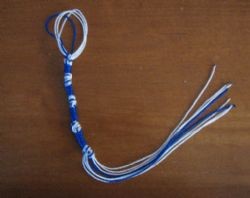
Moses himself was to be excluded from the land, although he might not have realized it at this point. But he would also wear the blue cords at the corner of his garment as an outward sign of his identification with the heavenly enterprise that would come to pass in the Land. Of course, in the New Testament, we see that Moses actually does make it to the Promised Land. He appears there on the Mount of Transfiguration with Jesus and Elijah. All the years of his wilderness wandering had ultimately led him to the mount where he would meet the One to whom he had been attached and identified by faith fifteen hundred years earlier.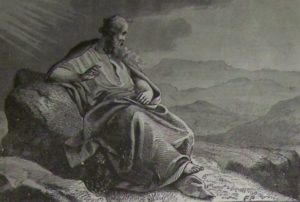
Even in the wilderness, the sons of Israel were to live as those belonging to the land, even though they would be for a time excluded from it. They were still citizens of heaven, subjects of the government of God, and partakers of a heavenly calling.
20 For our citizenship is in heaven, from which also we eagerly wait for a Savior, the Lord Jesus Christ; Philippians 3:20 (NASB)
Korah, a Kohathite of the tribe of Levi, conspired with the sons of Eliab, Dathan, and Abiram, and On, the son of Peleth, (all three from the tribe of Reuben) to challenge Moses. The conspiracy spread, soliciting the support of 250 leaders of renown who rose up against Moses and Aaron.
Moses once again falls on his face before the Lord in intercession. He then challenges Korah to appear the next morning before the Tent of Meeting. The Lord Himself will show who is authorized for the holy leadership role among His people. Korah and his fellow conspirators were to take coals from the holy fire and censers with holy incense and appear before the Presence of the Lord at the Tent of Meeting.
At first, Dathan and Abiram refuse to comply, insisting that Moses had no right to “lord it over” the people.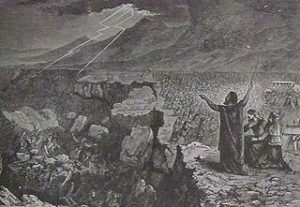
Rather than lashing back at the conspirators, Moses brought his heart cry to the Lord. He pleads his case of being innocent of having caused these men harm (16:15).
The sons of Korah were jealous not only of Moses’ authority but the privileges of Aaron and his sons to serve in the Holy Place.
On the following morning, the Lord is poised to bring retribution to the entire congregation. Once again Moses intercedes for the people, insisting that not all should have to pay for one man’s sin.
The Lord vindicated His authority as the earth opened up its mouth and swallowed up Korah, Dathan, and Abiram and all their households. The 250 conspirators who insisted that they had sacred rights to bring incense before the Lord were destroyed by fire that came from the Lord.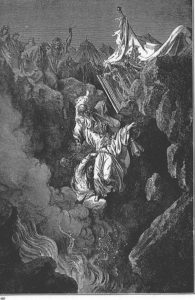
Eleazar the priest takes the holy censers out of the blaze and hammers them into sheets for a plating to cover the altar of incense. This was a reminder that only those authorized by God (Aaron and his sons) should come near to burn incense before the Lord, or they will suffer the destruction that came upon Korah and his company of conspirators.
NEW TESTAMENT READING: Mark 15:1-47
THE PRIESTS INTERROGATE JESUS – ARE YOU THE CHRIST?
When Jesus appeared before Israel’s religious leaders he was questioned if He was ‘the Messiah’. Jesus replied with the sacred name of God, “I am”, and explained that He was more than what they expected the Messiah to be. He was the Son of God, and then, in the context of the Scriptures from Daniel Chapter 7, that He will return as the judge of all humankind. One day the table will be reversed, and they will not be interrogating Him, He will be interrogating them (Mark 14:61-62).
13 “I kept looking in the night visions, and behold, with the clouds of heaven One like a Son of Man was coming, And He came up to the Ancient of Days And was presented before Him. 14 “And to Him was given dominion, Glory and a kingdom, that all the peoples, nations and men of every language might serve Him. His dominion is an everlasting dominion Which will not pass away; And His kingdom is one Which will not be destroyed. (Daniel 7:13-14; NASB)
PILATE INTERROGATES JESUS- ARE YOU THE KING OF THE JEWS?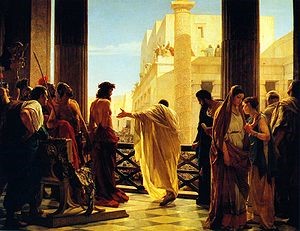
Pilate asks Jesus if He is the King of the Jews, and Jesus responds, “It is as you say” (Mark 15:2).
Jesus is silent before the harsh accusations of the chief priests. Pilate is amazed. He is amazed again as the people choose to set free Barabbas, a known murderer, and insurrectionist, instead of Jesus who had yet to be proven guilty of any misdeed.
The crowd did not just demand that Barabbas be freed and Jesus returned to prison, but that Jesus be crucified.
One by one Old Testament prophecies are being fulfilled. But Mark is writing to a Gentile audience and unlike Matthew does not reference the Old Testament Scriptures. He focuses primarily on the action. The authorities bind and deliver Him into the hands of sinners, who are scheming, questioning, accusing, shouting, scourging, mocking, abusing, dressing Him in purple, crowning Him with thorns, beating Him with fists and with reeds. They whip His back with fragments of metal that tear His flesh. They spit on Him and lead Him away to be crucified.
On Golgotha, “the place of the Skull”, the heel of the Promised Seed is bruised, but the Serpent is crushed.
THE THICK DARKNESS
All accounts of the crucifixion of Christ note that darkness was over the earth from the sixth hour until the ninth hour, from noon to 3 PM.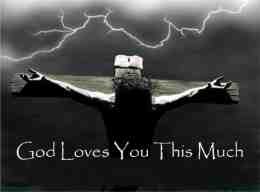
Some have surmised that this was an eclipse of the sun. Eclipses don’t last more than a few minutes. They also don’t occur at the time of a full moon. Some have thought it to be a windstorm. But Passover was in the wet spring season and not the dry dust time of year.
It seems that this darkness was similar to the judgment that fell upon Egypt; the ninth plague at the time of the first Passover.
21 Then the LORD said to Moses, “Stretch out your hand toward the sky, that there may be darkness over the land of Egypt, even a darkness which may be felt.” 22 So Moses stretched out his hand toward the sky, and there was thick darkness in all the land of Egypt for three days. 23 They did not see one another, nor did anyone rise from his place for three days, but all the sons of Israel had light in their dwellings.
Exodus 10:21-23 (NASB)
This time the judgment was not coming down on Egypt but on Christ, the Passover Lamb, the Appointed Substitute for the Firstborn, the Redeemer Priest.
33 When the sixth hour came, darkness fell over the whole land until the ninth hour. 34 At the ninth hour Jesus cried out with a loud voice, “ELOI, ELOI, LAMA SABACHTHANI?” which is translated, “MY GOD, MY GOD, WHY HAVE YOU FORSAKEN ME?”
Mark 15:33-34 (NASB)
The thick veil that separated the Holiest of All from the Holy Place in the temple of Jesus’ day was much bigger and thicker than the one that was in the Tabernacle in the Wilderness. The Tabernacle curtain could be folded and placed over the ark as a covering. The veil in the temple was massive, heavy, and thick. We are told that teams of oxen pulling on opposite sides could not tear it. This was the veil that separated people from the Presence of God in the Holiest of All. But when Jesus died on the cross saying, “It is finished”, the veil was torn from top to bottom. The fact that it was torn from top to bottom was an indication of who did it. Through the perfect atoning sacrifice of Christ on the altar of the cross, and His shed blood, put as it were on the mercyseat, justice is satisfied, and mercy is released. The barrier that excludes sinners from the presence of a holy God is removed. We can boldly come to God on the basis of Jesus’ perfect work of redemption.
THE ROMAN CENTURION
Access to the glory of God’s grace is now open to all. Sinners who join themselves to Christ by faith can find instant forgiveness and acceptance.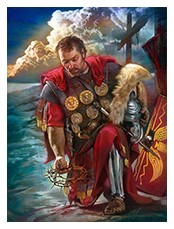
The Roman centurion seems to be the first to draw near to “the Holiest of All”, now that the veil had been torn in two.
39 When the centurion, who was standing right in front of Him, saw the way He breathed His last, he said, “Truly this man was the Son of God!” Mark 15:39 (NASB)
The Roman Centurion by Nathan Greene (copies available)
http://www.nathangreene.com/prod_detail_list/73
In seeing the way Jesus breathed, he heard Jesus’ last words. “Father forgive. It is finished. Into your hands I commend my Spirit.”
His confession of faith is especially significant in that the only person a loyal Roman subject would call “the Son of God” would be Caesar. Roman coins bore the inscription, “Tiberius Caesar, son of the Divine Augustus”. Yet this man having witnessed Jesus’ suffering and death was convicted to the core, that Jesus was the true Son of God.
TODAY’S READING FROM THE BOOK OF PSALMS– Psalm 54:1-7.
The reading from Psalm 54 is a prayer of deliverance (“deliver us from evil”) and the reading from Proverbs 11 is a reminder to pray that we will not be led into temptation by our evil desires and unfaithfulness.
The Psalmist cries out: “Save me, O God, by Your name, and vindicate me by Your power.” (v.1). He thanks God that He does hear when we pray. “For He has delivered me from all trouble, and my eye has looked with satisfaction upon my enemies.” (v.7)
“Behold, God is my helper; The Lord is the sustainer of my soul” (v.4)
TODAY’S READING FROM THE BOOK OF PROVERBS- Proverbs 11:5-6
Proverbs 11:5-6 5 The righteousness of the blameless will smooth his way, But the wicked will fall by his own wickedness. 6 The righteousness of the upright will deliver them, But the treacherous will be caught by their own greed.
‘The righteousness of the blameless’ refers to those who choose to walk according to the law of the Spirit of life in Christ Jesus. The wicked speaks of those who choose to live according to their deceitful desires.
PRAY FOR THE NATIONS
Republic of Bolivia
Latin America
Geography
Area: 1,099,000 sq. km
Landlocked Andean state. High plateau in southwest, tropical lowlands in north and east. One of only two landlocked republics in the Americas.
Population: 10,030,832 Annual Growth: 1.78%
Capital: La Paz (administrative); Sucre (legal)
Urbanites: 66.5%
HDI Rank: 113 of 182 (UN Human Development Reports 2009)
Answer to Prayer
Aymara and Quechua peoples, who date back to pre-Inca times, have both experienced major church growth in their midst, and spiritual responsiveness seems to be increasing.
Challenge for Prayer
Poverty, economics and the coca leaf are inextricably linked. Around 70% of the population are mired in poverty, half of those in abject poverty. Growing coca is much more profitable than growing other agricultural products, and many of Bolivia’s population are farmers. The president advocates growing the leaf for traditional purposes, but it is impossible to control how all of the coca-leaf harvest is processed. Pray that individuals, both those in power and those in poverty, would have the courage to reject temptation and to make good decisions.
PRAYER: Our Father, we are reminded that we who believe have been joined in identification with Your Son, our heavenly bridegroom, and by one Spirit we have access into Your holy presence. Thank You for Your Unfailing Word. We cleave to all You have said and accomplished in Christ. Help us to remember! May Your promises be like mental tassels that direct our attention to eternal realities. May we remember Your promise that we are joined to the Lord and citizens of Your eternal kingdom. We pray as we align ourselves with Your eternal purpose, may Your kingdom come, and Your will be done on earth as it is in heaven. In Jesus’ Name, Amen
Pastor David
So, naturally, we proclaim Christ! We warn everyone we meet, and we teach everyone we can, all that we know about him, so that, if possible, we may bring every man up to his full maturity in Christ. (Colossians 1:28, J.B. Phillips paraphrase)
New Life Community Church, Concord, MA 10742
www.newlife.org

